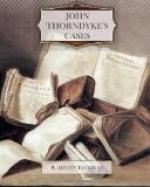Thorndyke nodded. “Yes,” he said, “that is certainly the line the prosecution will take if we allow the story to become known. Ha! what is this? We are going to have some rain.”
“Yes, and wind too. We are in for an autumn gale, I think.”
“And that,” said Thorndyke, “may turn out to be an important factor in our case.”
“How can the weather affect your case?” I asked in some surprise. But, as the rain suddenly descended in a pelting shower, my companion broke into a run, leaving my question unanswered.
On the following morning, which was fair and sunny after the stormy night, Dr. Burrows called for my friend. He was on his way to the extemporized mortuary to make the post-mortem examination of the murdered man’s body. Thorndyke, having notified the coroner that he was watching the case on behalf of the accused, had been authorized to be present at the autopsy; but the authorization did not include me, and, as Dr. Burrows did not issue any invitation, I was not able to be present. I met them, however, as they were returning, and it seemed to me that Dr. Burrows appeared a little huffy.
“Your friend,” said he, in a rather injured tone, “is really the most outrageous stickler for forms and ceremonies that I have ever met.”
Thorndyke looked at him with an amused twinkle, and chuckled indulgently.
“Here was a body,” Dr. Burrows continued irritably, “found under circumstances clearly indicative of murder, and bearing a knife-wound that nearly divided the arch of the aorta; in spite of which, I assure you that Dr. Thorndyke insisted on weighing the body, and examining every organ—lungs, liver, stomach, and brain—yes, actually the brain!—as if there had been no clue whatever to the cause of death. And then, as a climax, he insisted on sending the contents of the stomach in a jar, sealed with our respective seals, in charge of a special messenger, to Professor Copland, for analysis and report. I thought he was going to demand an examination for the tubercle bacillus, but he didn’t; which,” concluded Dr. Burrows, suddenly becoming sourly facetious, “was an oversight, for, after all, the fellow may have died of consumption.”
Thorndyke chuckled again, and I murmured that the precautions appeared to have been somewhat excessive.
“Not at all,” was the smiling response. “You are losing sight of our function. We are the expert and impartial umpires, and it is our business to ascertain, with scientific accuracy, the cause of death. The prima facie appearances in this case suggest that the deceased was murdered by Draper, and that is the hypothesis advanced. But that is no concern of ours. It is not our function to confirm an hypothesis suggested by outside circumstances, but rather, on the contrary, to make certain that no other explanation is possible. And that is my invariable practice. No matter how glaringly obvious the appearances may be, I refuse to take anything for granted.”




